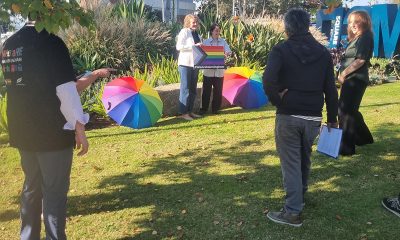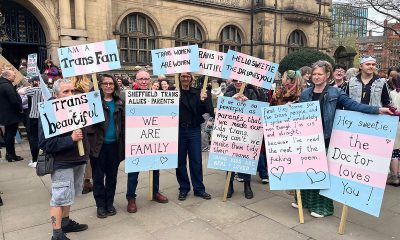World
Out in the World: LGBTQ news from Europe and Asia
Thousands participated in Belgrade Pride in Serbia on Sept. 7

SERBIA
Thousands of people marched through the Serbian capital on Sept 7 in what organizers are calling the largest Belgrade Pride yet. The march went off peacefully under the protection of a heavy police presence, a marked contrast to previous years that have seen the march threatened or canceled due to violent anti-LGBTQ protestors.
This year’s Pride marchers were demanding that the government pass laws to expand LGBTQ rights, including a long-promised same-sex partnership law and a law to facilitate legal gender recognition.
The march route took participants past the Serbian parliament, where organizers read out a list of demands and an unidentified participant hung a rainbow flag from an office window.
“Politicians, with political will, could easily fulfill the demands. Of course, it is also important that these laws are then applied,” Goran Miletic, one of the Pride organizers, told media.
A civil union bill has been under discussion by the Serbian government since 2019, under former Prime Minister Ana Brnabic, who is openly lesbian. But after years of consultations, President Alexander Vucic announced in 2021 that he would veto the bill if it passed parliament. While consultations have continued, the bill has been effectively stalled since then.
Serbia is also required by the European Convention on Human Rights to provide some legal recognition to same-sex couples.
Serbian European Integration Minister Tanja Miscevic attended the Pride event and told media that the government is still considering civil union legislation, though she offered no timeline to implement it.
“The issue is protecting the rights of various citizens, which must be equalized with the rights that we all have,” Miscevic told media at the event.
Belgrade Pride was first celebrated in 2001 with a march that was attacked by right-wing organizations, leaving more than 40 people injured. After several failed attempts to hold a second parade, the next Belgrade Pride was held in 2010, which led to street battles between police and anti-LGBTQ protestors, with more than 100 officers injured and more than 250 arrests. Pride was banned by authorities in 2011 and 2012, before being revived in 2014.
In 2022, Belgrade was due to host EuroPride, but authorities denied permits at the last minute, citing security concerns, and only a shortened march was held.
ALBANIA
A conservative member of the Albanian parliament is stirring up a homophobic controversy over a third grade language textbook that depicts a wizard in a rainbow robe on its cover.
The controversy was first kicked up by right-wing commentator Auron Kalaja, who posted the cover of the textbook “Gjuha Shqipe” on Instagram with a caption directing parents to “reject this book.”
“What is the meaning of the rainbow and its colors on the cover of the most beautiful subject?! Will this creature holding a magic wand change the children’s minds so that the latter ones change sex or … ?!” Kalaja wrote.
Tritan Shehu, an MP from the right-leaning Democratic Party, claimed that the textbook was an attempt by the government to “deform” children, in a Sept. 6 Facebook post.
“The cover of the official text of ‘Gjuha Shqipe’ for children is a cynical insult on children, their development, their future and their vision for life and family,” he writes. “A child appears there and on top of that a ‘man’ with a beard wearing a dress of ‘rainbow’ colors, dancing barefoot like a woman!!! Here we are not dealing with coincidences, but with a strategy of the regime, dangerous gender for sexual orientation in the new female age.”
While the comments have stirred up outrage in the predictable circles, the book’s publisher Albas backed the design in a statement, noting the book has been used in schools for eight years without any complaints from parents or educators.
Albas’ statement explains that both the rainbow and the wizard relate to stories contained in the textbook.
“The tendentious and discriminatory interpretations, the more they spread on social networks and in the media, the more they deepen the crisis we are going through as a society, damaging the mental health of children,” Albas’s statement reads.
GEORGIA
The government got one step closer to passing its draconian anti-LGBTQ “propaganda” law last week, as the bill secured passage at second reading in parliament. A final vote is scheduled for Sept. 17.
The ruling Georgian Dream party introduced the bill this summer, drawing swift condemnation from Western allies. Analysts believe the government is using the bill to foment division among the opposition ahead of parliamentary elections scheduled for late October.
The bill, inspired by similar legislation passed by Russia in 2013, would ban any gathering, product, or educational program that “popularizes” LGBTQ people or identities, bans gender-related care for trans people and legal recognition of their gender, bans any legal recognition of same-sex couples, bans adoption by same-sex couples, and bans any marriage by non-heterosexual or non-cisgender people.
The passage at second reading was strongly condemned by the European Union in a statement.
“This package undermines the fundamental rights of Georgian people and risks further stigmatization and discrimination of part of the population,” the statement reads. “The EU calls on the Georgian authorities to entirely reconsider this legislative package.”
Georgian Dream has taken an increasingly authoritarian and anti-Western stance in recent years, positioning itself and its patron Russia as a bulwark against liberal and inclusive European values that it portrays as promoting LGBTQ rights.
This turn has come despite the public’s overwhelming support for EU membership, and the government’s stated goal of joining the bloc. The country was given candidate status last year, but recent anti-democratic actions have led the bloc to threaten to suspend its candidacy.
Earlier this year, Georgia passed a “foreign agents” bill, requiring any organization that receives funding from abroad to register as an agent of a foreign power or face stiff fines and sanctions. Critics said the law, also inspired by a similar Russian law, was an attempt to silence and discredit opposition groups, the media, and civil society organizations.
Several Eastern European countries have adopted or considered “LGBT propaganda” bills recently. Lithuania and Hungary both have laws banning promotion of LGBTQ issues to minors on the books, though Lithuania’s has been ruled in violation of the European Convention on Human Rights. A similar bill has been proposed in Slovakia.
HONG KONG
NGOs serving the LGBTQ community have faced deep cutbacks in funding from the government over the past year, putting services and events the queer community relies on in jeopardy.
The Hong Kong Free Press reports that groups like Gay Harmony and PrideLab have had to cut back staff and resources in the wake of surprise cuts to grants they have received from the government.
That’s led the groups to cancel HIV awareness and outreach programs, and the annual Pride Market.
These groups had received money from the Constitutional and Mainland Affairs Bureau’s Equal Opportunities (Sexual Orientation) funding scheme since 1998. Between 2018-2023, CMAB had allocated funding to between 18 and 24 organizations, with a budget of HK$1.3 million (approximately $170,000). But for the current fiscal year, that’s dropped to 10 organizations from a budget of just under HK$700,000 (approximately $90,000).
Compounding the damage, the CMAC also allocates funds to three anti-LGBTQ organizations that promote conversion therapy — New Creation Association, Post Gay Alliance, and the Hong Kong Psychosexual Education Association.
Additionally, the city’s AIDS Trust Fund has also drastically reduced funding to LGBTQ organizations.
Hong Kong’s queer activists say this reflects an overall shift in attitudes from the city’s government.
While previously, the Equal Opportunities Commission attended LGBTQ events in support of the community, the EOC has announced it no longer considers it “suitable” to engage in activities in support of possible legislation on banning anti-LGBTQ discrimination.
The situation in Hong Kong has become complex for LGBTQ people, since Beijing has moved to exert greater control over the former British colony.
NGOs are reluctant to accept funds from foreign governments, lest they be branded a potential national security threat. Public demonstrations and Pride events have also become more difficult to plan and receive approval for.
Uganda
World Bank resumes lending to Uganda
New loans suspended in 2023 after Anti-Homosexuality Act signed

The World Bank Group has resumed lending to Uganda.
The bank in 2023 suspended new loans to the African country after President Yoweri Museveni signed the Anti-Homosexuality Act, which contains a death penalty provision for “aggravated homosexuality.” Reuters reported the bank decided to resume lending on June 5.
“We have now determined the mitigation measures rolled out over the last several months in all ongoing projects in Uganda to be satisfactory,” a bank spokesperson told Reuters in an email. “Consequently, the bank has prepared three new projects in sectors with significant development needs – social protection, education, and forced displacement/refugees – which have been approved by the board.”
Activists had urged the bank not to resume loans to Uganda.
Richard Lusimbo, director general of the Uganda Key Population Consortium, last September described the “so-called ‘mitigation measures’ are a façade, designed to provide the illusion of protection.”
“They rely on perpetrators of discrimination — the government of Uganda — to implement the measures fairly,” said Lusimbo. “How can they be taken seriously?”
South Africa
South African activists demand action to stop anti-LGBTQ violence
Country’s first gay imam murdered in February
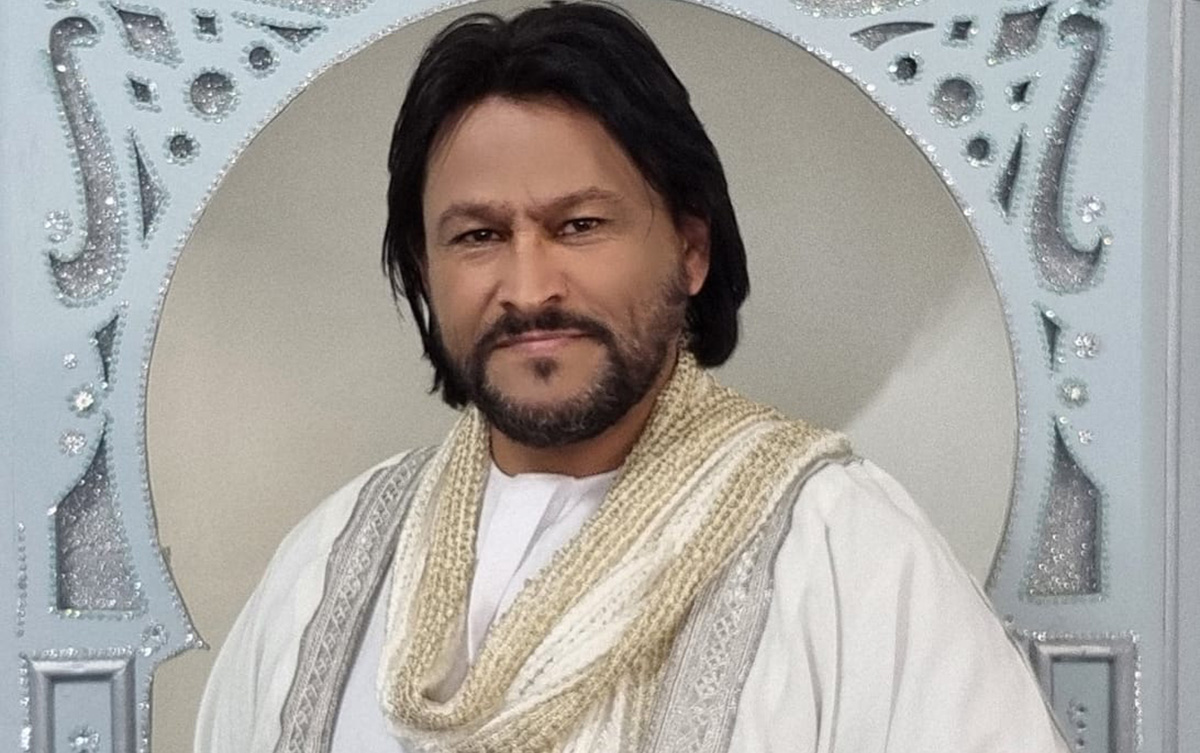
Continued attacks of LGBTQ South Africans are raising serious concerns about the community’s safety and well-being.
President Cyril Ramaphosa in May 2024 signed the Preventing and Combating of Hate Crimes and Hate Speech Bill into law that, among other things, has legal protections for LGBTQ South Africans who suffer physical, verbal, and emotional violence. Statistics from the first and second quarters of 2025 have painted a grim picture.
Muhsin Hendricks, the country’s first openly gay imam, in February was shot dead in Gqeberha, in a suspected homophobic attack. Authorities in April found the body of Linten Jutzen, a gay crossdresser, in an open field between an elementary school and a tennis court in Cape Town.
A World Economic Forum survey on attitudes towards homosexuality and gender non-conformity in South Africa that Marchant Van Der Schyf conducted earlier this year found that even though 51 percent of South Africans believe gay people should have the same rights as their heterosexual counterparts, 72 percent of them feel same-sex sexual activity is morally wrong. The survey also notes 44 percent of LGBTQ respondents said they experienced bullying, verbal and sexual discrimination, and physical violence in their everyday lives because of their sexual orientation.
Van Der Schyf said many attacks occur in the country’s metropolitan areas, particularly Cape Town, Durban, and Johannesburg.
“Victims are often lured to either the perpetrator’s indicated residence or an out-of-home area under the appearance of a meet-up,” said Van Der Schyf. “The nature of the attacks range from strangulation and beatings to kidnapping and blackmail with some victims being filmed naked or held for ransom.”
The Youth Policy Committee’s Gender Working Group notes South Africa is the first country to constitutionally protect against discrimination based on sexual orientation and the fifth nation in the world to extend marriage rights to same-sex couples. A disparity, however, still exists between legal protections and LGBTQ people’s lived experiences.
“After more than 20 years of democracy, our communities continue to wake up to the stench of grief, mutilation, violation, and oppression,” said the Youth Policy Committee. “Like all human beings, queer individuals are members of schooling communities, church groups, and society at large, therefore, anything that affects them should affect everyone else within those communities.”
The Youth Policy Committee also said religious and cultural leaders should do more to combat anti-LGBTQ rhetoric.
“Religious institutions seem to perpetuate the hate crimes experienced by queer individuals,” said the group. “In extreme cases, religious leaders have advocated for killings and hateful crimes to be committed against those in the queer community. South Africa’s highly respected spiritual guides, sangomas, are also joining the fight against queer killings and acts of transphobia and homophobia.”
“The LGBTQIA+ community is raising their voice and they need to be supported because they add a unique color to our rainbow nation,” it added.
Steve Letsike, the government’s deputy minister for women, youth, and persons with disabilities, in marking the International Day Against Homophobia, Biphobia, and Transphobia on May 17 noted Ramaphosa’s administration has enacted legislative framework that protects the LGBTQ community. Letsike, however, stressed the government still needs to ensure its implementation.
“We have passed these policies and we need to make sure that they are implemented fully and with urgency, so that (LGBTQ) persons can self-determine and also have autonomy without any abusive requirements,” said Letsike. “We need families, faith leaders, traditional authorities, and communities to rise together against hate. Our constitution must remain respected.”
Siphokazi Dlamini, a social justice activist, said LGBTQ rights should be respected, as enshrined in the constitution.
“It is terrible to even imagine that they face discrimination despite the fact that this has been addressed numerous times,” said Dlamini. “How are they different from us? Is a question I frequently ask people or why should they live in fear just because we don’t like the way they are and their feelings? However, I would get no response.”
Dlamini added people still live in fear of being judged, raped, or killed simply because of who they are.
“What needs to be addressed to is what freedom means,” said Dlamini. “Freedom means to have the power to be able to do anything that you want but if it doesn’t hurt other people’s feelings while doing it. There is freedom of speech, freedom from discrimination, freedom of expression, of thought, of choice, of religion, of association, and these needs to be practiced. It is time to take such issues seriously in order to promote equality and peace among our people, and those who do not follow these rules should be taken into custody.”
Van Der Schyf also said LGBTQ South Africans should have a place, such as an inquiry commission, that allows them to talk about the trauma they have suffered and how it influences their distrust of the government.
Chile
Gay pharmacist’s murder sparks outrage in Chile
Francisco Albornoz’s body found in remote ravine on June 4

The latest revelations about the tragic death of Francisco Albornoz, a 21-year-old gay pharmacist whose body was found on June 4 in a remote ravine in the O’Higgins region 12 days after he disappeared, has left Chile’s LGBTQ community shocked.
The crime, which was initially surrounded by uncertainty and contradictory theories, has taken a darker and more shocking turn after prosecutors charged Christian González, an Ecuadorian doctor, and José Miguel Baeza, a Chilean chef, in connection with Albornoz’s murder. González and Baeza are in custody while authorities continue to investigate the case.
The Chilean Public Prosecutor’s Office has pointed to a premeditated “criminal plan” to murder Albornoz.
Rossana Folli, the prosecutor who is in charge of the case, says Albornoz died as a a result of traumatic encephalopathy after receiving multiple blows to the head inside an apartment in Ñuñoa, which is just outside of Santiago, the Chilean capital, early on May 24. The Prosecutor’s Office has categorically ruled out that Albornoz died of a drug overdose, as initial reports suggested.
“The fact that motivates and leads to the unfortunate death of Francisco is part of a criminal plan of the two defendants, aimed at ensuring his death and guaranteeing total impunity,” Folli told the court. “The seriousness of the facts led the judge to decree preventive detention for both defendants on the grounds that their freedom represents a danger to public safety.”
Prosecutors during a June 7 hearing that lasted almost eight hours presented conservations from the suspects’ cell phones that they say showed they planned the murder in advance.
“Here we already have one (for Albornoz.) If you bring chloroform, drugs, marijuana, etc.,” read one of the messages.
Security cameras captured the three men entering the apartment where the murder took place together.
Hours later, one of the suspects left with a suitcase and a shopping cart to transport Albornoz’s body, which had been wrapped in a sleeping bag. The route they followed to dispose of the body included a stop to buy drinks, potato chips, gloves, and a rope with which they finally descended a ravine to hide it.
Advocacy groups demand authorities investigate murder as hate crime
Although the Public Prosecutor’s Office has not yet officially classified the murder as a hate crime, LGBTQ organizations are already demanding authorities investigate this angle. Human rights groups have raised concerns over patterns of violence that affect queer people in Chile.
The Zamudio Law and other anti-discrimination laws exist. Activists, however, maintain crimes motivated by a person’s sexual orientation or gender identity are not properly prosecuted.
“This is not just a homicide, it is the cruelest expression of a society that still allows the dehumanization of LGBTQ+ people,” said a statement from Fundación Iguales, one of Chile’s main LGBTQ organizations. “We demand truth, justice, and guarantees of non-repetition.”
The Movement for Homosexual Integration and Liberation (Movilh), meanwhile, indicated that “since the first day the family contacted us, we have been in conversations with the Prosecutor’s Office so that this fatal outcome is thoroughly investigated, including the possible existence of homophobic motivations or components.”
The investigation into Albornoz’s murder continues, and the court has imposed a 90-day deadline for authorities to complete it.
-

 Photos5 days ago
Photos5 days agoPHOTOS: WorldPride Boat Parade
-
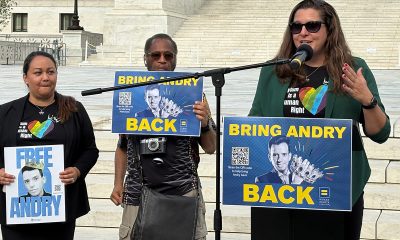
 U.S. Supreme Court5 days ago
U.S. Supreme Court5 days agoActivists rally for Andry Hernández Romero in front of Supreme Court
-

 Real Estate4 days ago
Real Estate4 days agoThe best U.S. cities for LGBTQ homebuyers in 2025
-
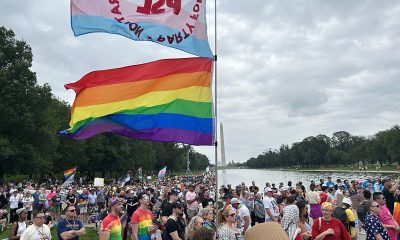
 World Pride 20254 days ago
World Pride 20254 days agoLGBTQ voices echo from the Lincoln Memorial at International Rally for Freedom



